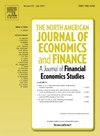工业智能能促进净零发展吗?资源依赖分析
IF 3.9
3区 经济学
Q1 BUSINESS, FINANCE
North American Journal of Economics and Finance
Pub Date : 2025-04-02
DOI:10.1016/j.najef.2025.102425
引用次数: 0
摘要
人工智能(AI)的日益普及引发了关于工业智能对经济变化影响的激烈争论,包括索洛悖论。工业智能如何影响资源依赖和净零发展?为了阐明这一问题,我们将扎根理论与动态随机一般均衡(DSGE)模型相结合,探讨工业智能对资源依赖和净零发展的可能影响。研究结果表明:(1)智能技术进步通过提高全要素生产率、促进劳动力市场动态演进和加速智能化来实现净零发展。(2)但智能技术进步存在显著的反弹效应。如果行业过于注重末端环节的智能化改造,如资源的智能化开发,会加剧资源依赖。(三)政府可以实施资源税政策,缓解工业智能化带来的资源环境问题,有利于稳定宏观经济,降低资源依赖,促进净零发展。研究结果丰富了技术进步理论,为构建智能友好型、资源节约型和净零社会提供了指导。本文章由计算机程序翻译,如有差异,请以英文原文为准。
Can industrial intelligence promote net-zero development? An analysis of resource dependence
The increasing prevalence of artificial intelligence (AI) has triggered intense debates on the impact of industrial intelligence on economic changes including the Solow paradox. How does industrial intelligence affect resource dependence and net-zero development? To shed some light on this question, we combine the grounded theory and dynamic stochastic general equilibrium (DSGE) model to explore what is the possible impact of industrial intelligence on resource dependence and net-zero development. Our results indicate that: (i) Intelligent technological progress enables net-zero development by boosting total factor productivity (TFP), promoting the labor market dynamic evolution, and accelerating intelligence. (ii) However, there is a significant rebound effect associated with intelligent technological progress. It will aggravate resource dependence if the industry pays too much attention to the intelligent transformation of the end link, such as intelligent resource exploitation. (iii) The government can implement resource tax policies to alleviate the resource-environment issues caused by industrial intelligence, which is conducive to stabilizing the macro economy, reducing resource dependence and promoting net-zero development. The findings enrich the technological progress theory and provide guidance for building an intelligent-friendly, resource-saving and net-zero society.
求助全文
通过发布文献求助,成功后即可免费获取论文全文。
去求助
来源期刊
CiteScore
7.30
自引率
8.30%
发文量
168
期刊介绍:
The focus of the North-American Journal of Economics and Finance is on the economics of integration of goods, services, financial markets, at both regional and global levels with the role of economic policy in that process playing an important role. Both theoretical and empirical papers are welcome. Empirical and policy-related papers that rely on data and the experiences of countries outside North America are also welcome. Papers should offer concrete lessons about the ongoing process of globalization, or policy implications about how governments, domestic or international institutions, can improve the coordination of their activities. Empirical analysis should be capable of replication. Authors of accepted papers will be encouraged to supply data and computer programs.

 求助内容:
求助内容: 应助结果提醒方式:
应助结果提醒方式:


